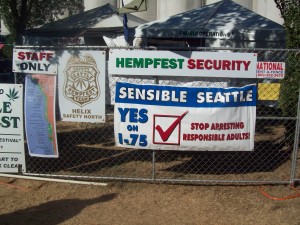This year marked the twentieth anniversay of the Seattle Hempfest. To mark the big occasion, U.S. Representative Dennis Kucinich spoke to a crowd of stoners pro-pot proponents. He compared the quest to legalize marijuana to the uprisings in the Middle East, the push for womens’ right to vote and the civil rights movement.
What? The movement to legalize marijuana is about many things: limited government, better use of tax dollars, bodily integrity, and fewer prisons. But it is not comparable to disposing of dictators, asking for the right to vote, or demanding equality.
Hempfest advertises that it is “first and foremost a political protest rally seeking to change America’s pot laws and to educate the public on the many uses of the cannabis plant,” and so I expected to hear some coherent argument for why pot should be legal. Instead, the masses of smoke and people were treated to comparisons of the civil rights movement.
But maybe “protestivals” such as Hempfest aren’t meant to be taken seriously; the event was low on education and high (sorry I couldn’t help myself) on resting places for the marijuana counter-culture to smoke. How smoking oneself retarded helps educate and change drug laws was lost on me. But maybe that’s the point. Maybe the point was to forget how costly the nation’s war on drugs is through the one act of civil disobedience that feels good.
If that’s the case, so be it. But I would argue that real change demands at least some real discussion. The people whose votes are needed and not adolescents sitting in circles sharing brownies and talking about how the “man” doesn’t understand. They are regular people, the kind who need to be convinced that marijuana prohibition is bad business for them, even if they don’t indulge in Pineapple Express, Purple Kush, and AK-47.



